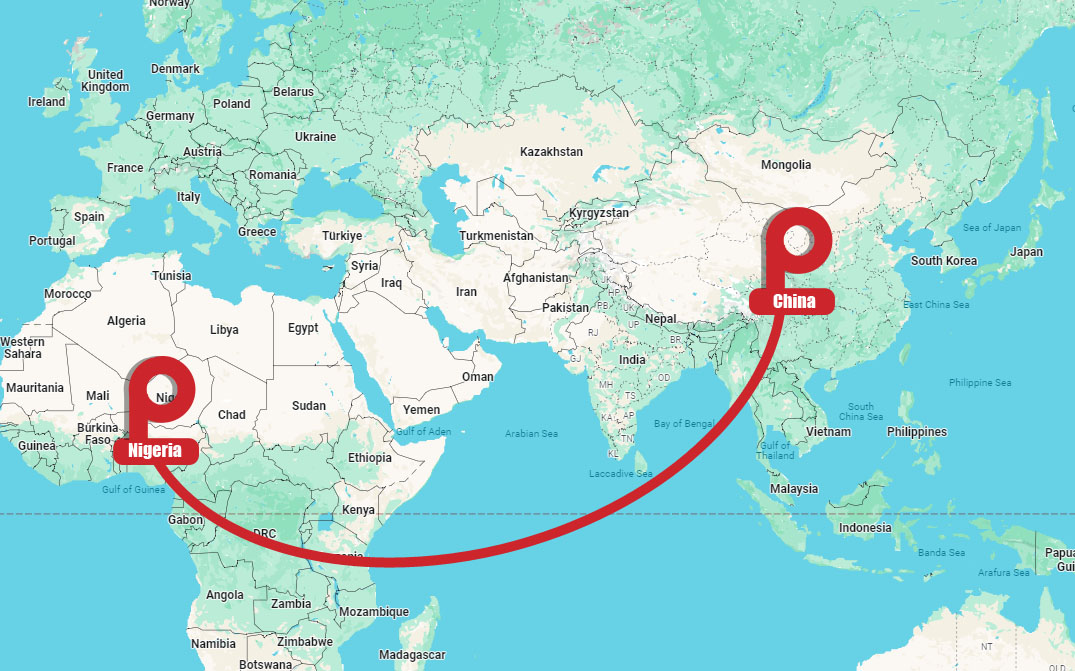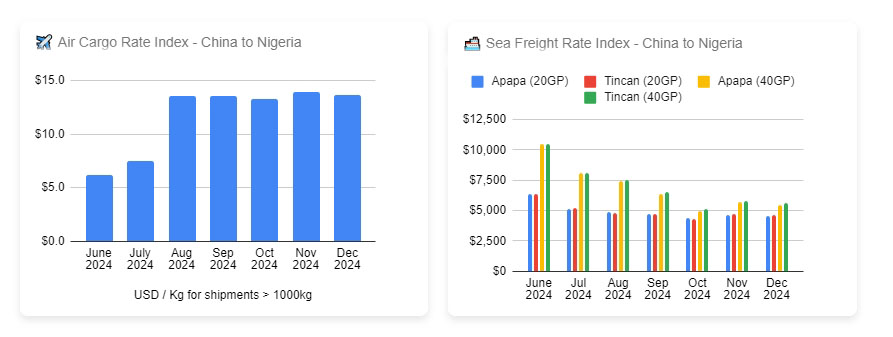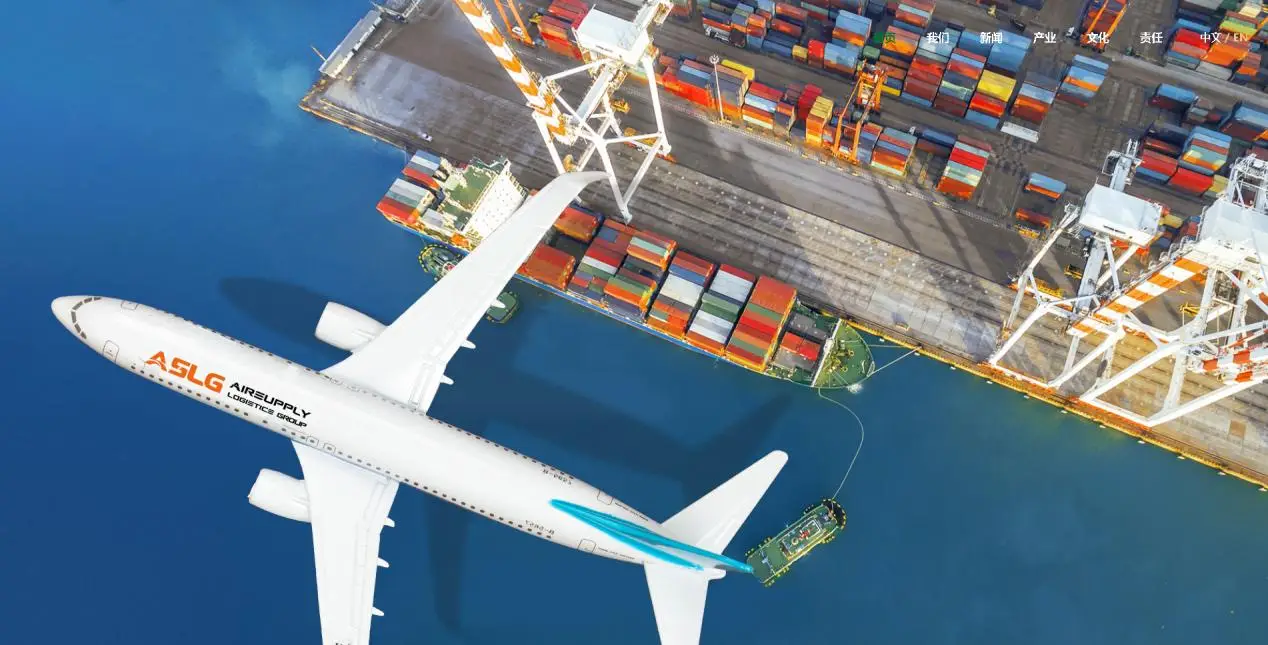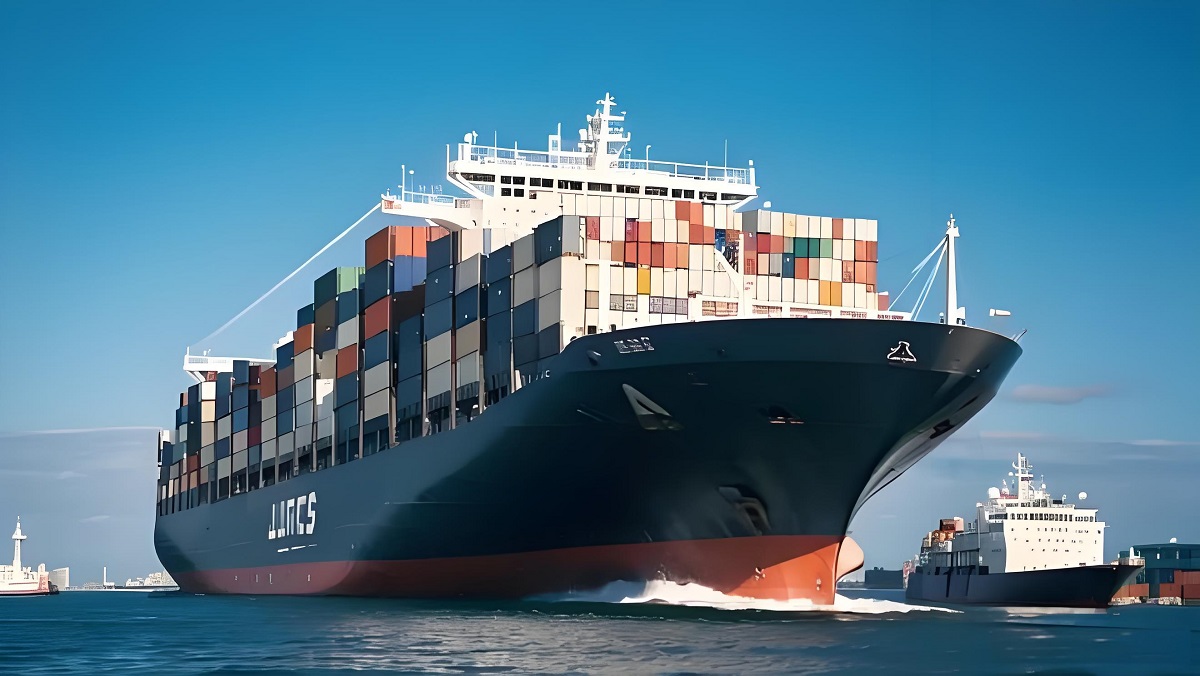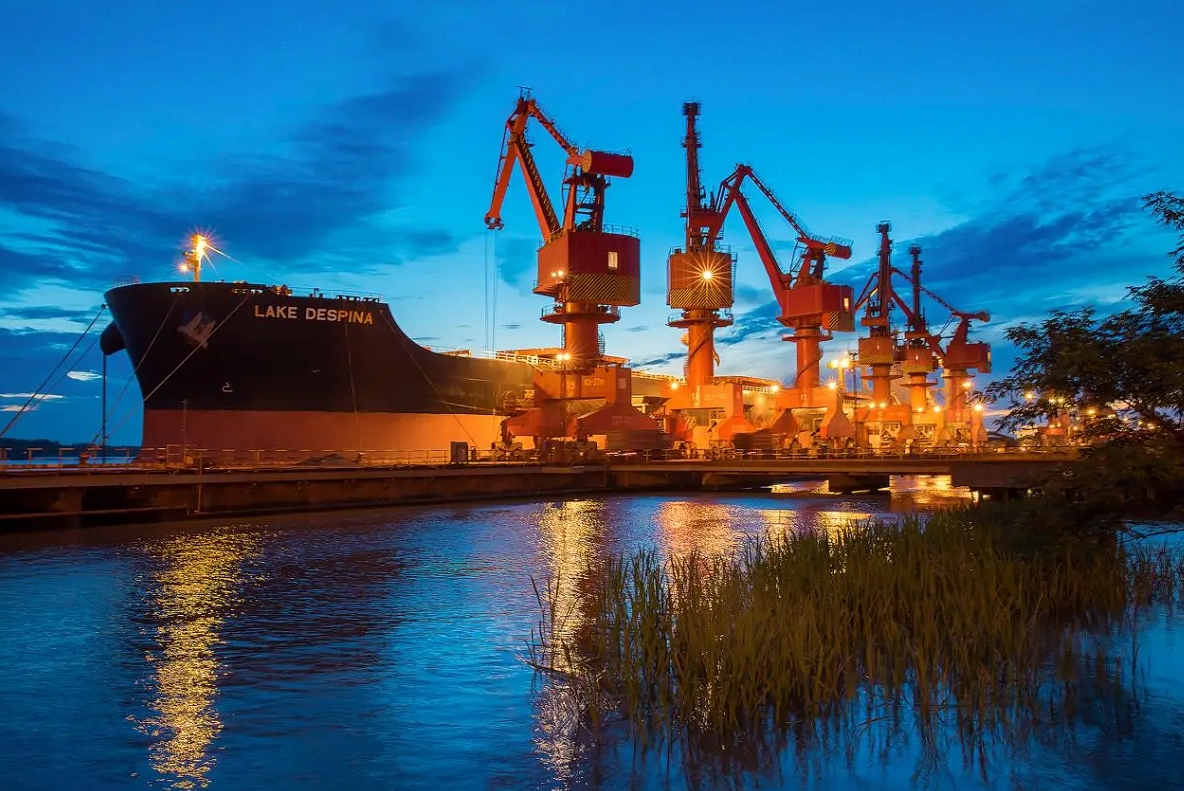Shipping from China to Nigeria | Sea & Air Freight Rates
How have China and Nigeria forged a trade relationship that benefits both nations? This brief exploration highlights the economic growth and development spurred by their collaboration, emphasizing the pivotal role of e-commerce platforms like Alibaba. These platforms have revolutionized access to global markets, simplifying logistics and customs processes, and showcasing the power of international cooperation in driving prosperity across borders.
DECEMBER 2024 SHIPPING UPDATE: FROM CHINA TO NIGERIA
Costs: Shipping costs have increased. Regular post costs $10-$20 per kilogram. Express shipping costs $30-$50 per kilogram. Air freight is $13,680 per ton with a transit time of 6-8 days. Sea freight is $4,550-$4,600 per 20-foot container and $5,500-$5,600 per 40-foot container, with a transit time of 50-55 days.
Delivery Times: Regular post takes 2-3 weeks. Express shipping typically takes 5-7 days. Air freight takes 6-8 days. Sea freight takes 50-55 days, with possible delays due to port congestion in Nigeria during the holiday season.
Customs: Efficient customs processing is crucial to avoid delays. Ensure all paperwork is accurately completed. Nigeria’s customs regulations require precise documentation, especially during peak shipping periods like December, to prevent hold-ups.
Global Events Impacting Nigeria: Geopolitical tensions, such as the Red Sea crisis, continue to impact global shipping. This has led to increased congestion and equipment shortages, affecting schedules and rates. Seasonal demand during December has further contributed to elevated shipping costs.
Outlook for Nigeria: Elevated rates and potential delays are expected through December. While demand has stabilized compared to pandemic levels, logistical challenges, including global equipment shortages and port congestion, are likely to keep rates high.
Summary for Nigerian Shippers: Stay informed about fluctuating shipping rates and potential delays. Ensure compliance with Nigeria’s customs regulations by completing all necessary paperwork accurately. Effective communication with logistics partners is essential to mitigate the impact of global and seasonal challenges. Be prepared for potential disruptions during the holiday season.
OVERVIEW OF COSTS BY SHIPPING MODE
| Shipping Mode | Price Range | Best For |
|---|---|---|
| LCL (Less than Container Load) | $30 to $60 per cubic meter | Small shipments not filling a full container |
| FCL (Full Container Load) – 20ft Container | $4,550 (Apapa) – $4,600 (Tincan) | Large shipments requiring an entire container |
| FCL (Full Container Load) – 40ft Container | $5,500 (Apapa) – $5,600 (Tincan) | Large shipments requiring an entire container |
| Express Shipping | $5 to $10 per kilogram | Urgent small packages |
| Air Freight | $13.68 per kilogram | High-value, time-sensitive goods |
ESTIMATING SHIPPING COSTS AND EFFECTIVE BUDGETING
To budget effectively for shipping from China to Nigeria, consider these factors:
- Fuel Surcharges: Can vary monthly, impacting overall costs.
- Customs Duties and Taxes: Depends on the goods’ classification. For electronics, expect around 5% to 20% of the cargo value.
- Other Fees: Include handling, documentation, and port fees.
Practical Tips:
- Utilize online calculators for preliminary estimates.
- Always account for total landed cost (TLC) for accurate budgeting.
- Consider seasonal fluctuations and exchange rate changes.
IMPACT OF IMPORT TAXES ON OVERALL SHIPPING COSTS
Did you know that import taxes and duties can drastically alter the cost of shipping goods from China to Nigeria? It’s not just about the shipping fee; the real game changer lies in the taxes applied upon entry. VAT and customs duties are the main players, significantly impacting the final price you pay. These charges are calculated based on the value of the goods, their classification, and the shipping terms used.
| Product Category | HS Code | Customs Duty (%) | VAT (%) | Additional Notes |
|---|---|---|---|---|
| Electronics | 85xxxx | 5-20 | 7.5 | May vary based on specific items |
| Clothing | 62xxxx | 12-20 | 7.5 | Depending on material and use |
| Machinery | 84xxxx | 5-10 | 7.5 | Includes industrial machinery |
| Agricultural Products | 02xxxx | 0-10 | 7.5 | Some items may have exemptions |
| Automotive Parts | 87xxxx | 10-20 | 7.5 | Depends on the part and vehicle type |
STRATEGIES TO MITIGATE TAX IMPACTS
Understand the tax rates: Familiarize yourself with Nigeria’s tariff schedule.
Proper classification: Ensure goods are correctly classified under the HS code.
Consider shipping terms: Terms like DDP (Delivered Duty Paid) can influence who bears the tax burden.
NAVIGATING LEGAL COMPLIANCE IN INTERNATIONAL SHIPPING
Tips for streamlining the customs clearance process include:
Documentation: Keep a meticulous record of all shipping documents, including commercial invoices and packing lists.
Regulatory knowledge: Stay updated on the latest import regulations and changes in tax rates.
Expert assistance: Consider partnering with experienced freight forwarders or customs brokers who understand the intricacies of Nigerian customs regulations.
You may also be interested in: DDP Shipping from China to Saudi Arabia
SEA FREIGHT FROM CHINA TO NIGERIA
Sea freight offers two primary shipping methods: Less than Container Load (LCL) and Full Container Load (FCL), each catering to different shipping needs from China to Nigeria.
| Shipping Option | Price Range/Cost | Transit Time | Best For |
|---|---|---|---|
| LCL Shipping | $30 to $60 per cubic meter | 50 to 55 days | Smaller shipments that don’t require the space of an entire container. Offers flexibility and cost savings for lower-volume shipments. |
| FCL Shipping – 20ft Container | $4,550 to $4,600 | 50 to 55 days | Larger shipments where you can fill a whole container. Provides security, privacy, and often a more cost-effective solution per unit shipped. |
| FCL Shipping – 40ft Container | $5,500 to $5,600 | 50 to 55 days | Larger shipments where you can fill a whole container. Provides security, privacy, and often a more cost-effective solution per unit shipped. |
SELECTING A SEA FREIGHT FORWARDER AND TOP SHIPPING ROUTES
The choice of sea freight forwarder is crucial for ensuring efficient, timely, and cost-effective delivery from China to Nigeria. Factors to consider include:
- Industry Reputation: Seek out forwarders with positive testimonials and a track record of successful shipments.
- Service Offerings: Ensure they provide comprehensive services, including customs clearance and door-to-door delivery if needed.
- Expertise: Knowledge in handling the specific type of goods you’re shipping is essential.
- Route Network: Forwarders with a strong presence in your shipping route can offer better rates and more reliable service.
Top Shipping Routes:
- From Shanghai to Lagos or Shenzhen to Lagos, with variations in cost and transit time based on the forwarder’s network and the specific service chosen. The choice of port in China and entry port in Nigeria can significantly affect both the cost and transit time of your shipment.
KEY PORTS IN CHINA AND NIGERIA FOR SHIPPING
| Port | Role & Features | Impact on Shipping |
|---|---|---|
| Shanghai (China) | World’s busiest container port, extensive shipping routes, state-of-the-art logistics. | Optimizes logistics efficiency and cost for exports to Nigeria. |
| Shenzhen (China) | Exceptional access to international markets, positioned near Hong Kong. | Ideal for exports with its exceptional market access. |
| Guangzhou (China) | Crucial hub for maritime trade in South China, robust infrastructure. | Supports a wide range of shipping needs with comprehensive services. |
| Lagos (Nigeria) | Largest port in Nigeria, extensive logistics infrastructure for efficient distribution. | Handles the majority of Nigeria’s imports, facilitating national distribution. |
| Port Harcourt (Nigeria) | Pivotal for the oil and gas sector, proficient customs clearance processes. | Key for shipments related to oil and gas, with efficient customs handling. |
| Calabar (Nigeria) | Strategic entry point for eastern Nigeria, offering lower congestion and potentially faster processing. | Suitable for shipments to eastern Nigeria, with benefits of lower congestion. |
MAJOR CHINESE PORTS FOR EXPORTS TO NIGERIA
The ports of Shanghai, Shenzhen, and Guangzhou stand as pivotal gateways for exports from China to Nigeria, each playing a significant role in the efficiency and cost-effectiveness of international shipping. These ports are not only among the largest and busiest in the world but also boast advanced facilities and services that cater to a wide range of shipping needs.
Shanghai: Known as the world’s busiest container port, it offers extensive shipping routes and state-of-the-art logistics solutions.
Shenzhen: Positioned near Hong Kong, it provides exceptional access to international markets, making it ideal for exports.
Guangzhou: A crucial hub for maritime trade in South China, known for its comprehensive services and robust infrastructure.
MAJOR NIGERIAN PORTS FOR IMPORTS FROM CHINA
When goods arrive in Nigeria from China, they primarily enter through the ports of Lagos, Port Harcourt, and Calabar. Each port has distinct features and capabilities that can significantly influence the shipping time and cost of imports.
Lagos: The largest port in Nigeria, handling the majority of the country’s imports. Its extensive logistics infrastructure facilitates efficient national distribution.
Port Harcourt: Located in the South-South region, it’s pivotal for the oil and gas sector, with proficient customs clearance processes.
Calabar: Though smaller, it serves as a strategic entry point for eastern Nigeria, offering lower congestion and potentially faster processing.
HOW TO SHIP FROM CHINA TO NIGERIA: A STEP-BY-STEP GUIDE
PREPARING YOUR SHIPMENT: DOCUMENTATION, PACKAGING, AND LABELING
Before your goods embark on their journey from China to Nigeria, it’s crucial to nail down the preparation phase. This involves more than just packing your items; it requires meticulous attention to documentation, packaging, and labeling. Properly preparing your shipment can prevent common pitfalls and ensure your goods clear customs smoothly.
- Documentation: Essential documents include the commercial invoice, packing list, and bill of lading. These documents should accurately describe the goods, their value, and the parties involved in the transaction.
- Packaging: Your goods must be packaged securely to withstand the rigors of international transit. Use quality materials and consider the nature of your goods when choosing packaging methods.
- Labeling: Labels should comply with both Chinese and Nigerian regulations, clearly displaying information such as contents, weight, and any handling instructions.
NAVIGATING CUSTOMS AND TRACKING YOUR SHIPMENT
The journey from China to Nigeria involves navigating the complexities of customs clearance while keeping a close eye on your shipment’s progress. Understanding the customs process and leveraging available tracking tools are key to a successful international shipment.
- Customs Clearance: Familiarize yourself with the customs regulations in both China and Nigeria. Ensure all duties and taxes are accurately assessed and paid to avoid hold-ups. Utilizing the correct Harmonized System (HS) codes for your goods is critical for proper duty assessment.
- Tracking Your Shipment: Utilize tracking tools provided by your freight forwarder, shipping line, or express courier service to monitor your shipment’s journey. Real-time tracking allows you to anticipate and manage any potential delays.
You may be interested in the following related articles:
- Shipping From China To Bahrain
- Shipping From China To South Africa
- Shipping From China To Kenya
- Shipping From China To Egypt
- Shipping From China To Israel
- Shipping From China To India
- Shipping From China To Pakistan
FREIGHT FORWARDERS FROM CHINA TO NIGERIA
ROLE OF FREIGHT FORWARDERS IN THE SHIPPING PROCESS
Freight forwarders play a pivotal role in the realm of international shipping, acting as the crucial link between shippers and transportation services. When shipping goodsfrom China to Nigeria, these entities take on the complex logistics, ensuring that your cargo navigates through the maze of global trade regulations and logistics channels efficiently.
They offer a suite of services that are indispensable for smooth international trade:
- Documentation Handling: Managing and preparing shipping and customs documents.
- Customs Clearance: Navigating the complexities of customs regulations to ensure goods are cleared quickly.
- Cargo Tracking: Offering visibility into the shipment’s journey, providing peace of mind and enabling better planning.
SELECTING THE RIGHT FREIGHT FORWARDER FOR YOUR NEEDS
Choosing the right freight forwarder is crucial for ensuring that your goods are transported from China to Nigeria without a hitch. Here are key factors to consider:
- Experience with the China-Nigeria Trade Route: Knowledge of this specific corridor can significantly impact the efficiency of your shipment.
- Network and Partnerships: A robust network means better options and potentially lower costs for your shipments.
- Service Offerings: Comprehensive services from warehousing to delivery can simplify logistics for businesses.
- Customer Service Reputation: Good customer service means better communication and problem-solving capabilities.
 English
English 简体中文
简体中文 繁體中文
繁體中文 Afrikaans
Afrikaans አማርኛ
አማርኛ Español
Español العربية
العربية Français
Français Cebuano
Cebuano Български
Български Беларуская мова
Беларуская мова हिन्दी
हिन्दी বাংলা
বাংলা Português
Português Русский
Русский اردو
اردو فارسی
فارسی Türkçe
Türkçe كوردی
كوردی Deutsch
Deutsch 日本語
日本語 ไทย
ไทย Tiếng Việt
Tiếng Việt Italiano
Italiano עִבְרִית
עִבְרִית 한국어
한국어 Română
Română Nederlands
Nederlands Bahasa Indonesia
Bahasa Indonesia


